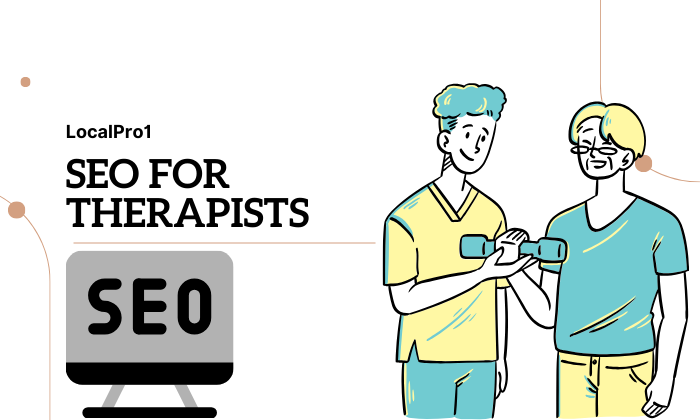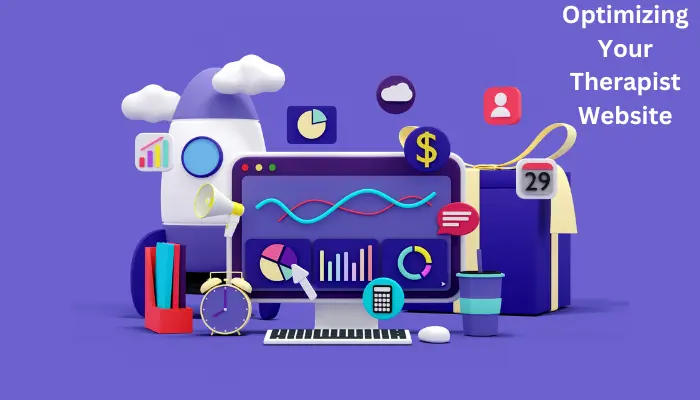Local SEO Services Near Me | Local Pro1 Welcome to...
Unlocking the Power of SEO for Therapists
Unlocking the Power of SEO for Therapists
In today’s digital age, where information is readily accessible at our fingertips, it’s crucial for therapists to recognize the profound significance of Search Engine Optimization (SEO) for their online presence. SEO serves as the bridge that connects therapists with potential clients actively seeking mental health services online. By optimizing their websites to rank higher in search engine results, therapists can effectively expand their reach, connect with individuals in need of their support, and establish a reputable online presence. LocalPro1 will provide the best services related to SEO for therapists.

Why SEO Matters for Therapists
Why SEO Matters for Therapists SEO is important for therapists and mental health professionals for several reasons:
Visibility and Reach: Many individuals searching for therapists start their journey online. Having a well-optimized website can help therapists reach a broader audience and connect with potential clients who are actively seeking their services.
Credibility and Trust: A website that appears prominently in search results can convey credibility and trustworthiness. People often trust the first few results on Google, so ranking well can positively impact a therapist’s reputation.
Competition: Therapists often face competition in their local areas. SEO can help them stand out from competitors and attract more clients by appearing higher in local search results.
Targeted Traffic: SEO allows therapists to target specific keywords and demographics, ensuring that their website is seen by individuals who are actively searching for therapy services in their area.
Cost-Effective Marketing: Compared to many other forms of advertising, SEO can be a cost-effective way for therapists to market their services in the long term. Once a website ranks well, it can continue to generate organic traffic without ongoing advertising expenses.
Educational Content: Therapists can use their websites to provide valuable educational content related to mental health topics. This not only helps potential clients but also demonstrates expertise and can attract organic traffic from individuals seeking information.
SEO Keyword Research for Therapists
Identifying Relevant Keywords for Therapists: Keyword research is a critical step in optimizing a therapist’s website for search engines. By identifying relevant keywords, you can attract potential clients who are actively searching for therapy services. Here’s a step-by-step guide on how to identify relevant keywords for therapists:
Brainstorm Primary Keywords: Start by brainstorming primary keywords that directly relate to your therapy practice. These should include terms like “therapist,” “therapy,” and the specific types of therapy you offer (e.g., “counseling,” “psychotherapy,” “marriage counseling,” “CBT therapy”).
Localize Keywords: If you’re a local therapist, include location-specific keywords such as the name of your city or neighborhood.
Use Synonyms and Variations: Expand your list by including synonyms and variations of your primary keywords. For instance, “psychotherapist” instead of just “therapist” or “relationship counseling” instead of “marriage counseling.”
Long-Tail Keywords: Include long-tail keywords in your content because they are more specialized and less crowded. These might include phrases like “child therapy for anxiety in Los Angeles” or “online therapy for depression.”
Competitor Analysis: Analyze your competitors’ websites and see what keywords they are targeting.
Google Suggest and Related Searches: Use Google’s autocomplete feature to find additional keywords. When you start typing a keyword into Google, it suggests related phrases that people commonly search for.
Keyword Research Tools: Utilize keyword research tools like Google Keyword Planner, Moz Keyword Explorer, or Ubersuggest. These tools can provide data on search volume, competition, and suggest related keywords.
Consider Intent: Consider the motivation behind the terms. Are people searching for information, services, or products? Tailor your content accordingly.
Evaluate Competitiveness: Assess the competition for each keyword. High competition keywords may be more challenging to rank for, so prioritize those that strike a balance between relevance and competition.
Create a Keyword List: Organize your keywords into a list or spreadsheet, categorizing them by relevance and search volume.
Utilizing Secondary Keywords: Secondary keywords, also known as LSI (Latent Semantic Indexing) keywords, are related terms that help search engines understand the context of your content. Here’s how to utilize secondary keywords effectively:
Content Optimization: Incorporate secondary keywords naturally within your content. Use them in headings, subheadings, and throughout the body of your text. This helps improve the overall SEO of your page.
Avoid Keyword Stuffing: Don’t overuse keywords. Make sure your information flows organically with them. Your SEO efforts may be harmed by keyword stuffing..
Enhance User Experience: Write for your audience first. Provide valuable information and content that genuinely addresses the needs of your potential clients.
Use Semantic Search: Understand the semantic relationships between primary and secondary keywords. Google’s algorithms have become better at recognizing context and synonyms.
Monitor Performance: Check the effectiveness of your website frequently using programs like Google Analytics. Track which keywords are driving traffic and conversions.
Update Content: As search trends change, revisit and update your content to include new secondary keywords or modify existing ones.
Optimizing Your Therapist Website

asing your online visibility. Here’s a breakdown of the key techniques and strategies you can implement:
On-Page SEO Techniques:
Title Tags and Meta Descriptions: Ensure that each page on your therapist website has a unique and descriptive title tag that includes relevant keywords. Write compelling meta descriptions that accurately summarize the content of each page and encourage click-throughs from search engine results.
Header Tags (H1, H2, H3): Use header tags to structure your content. The H1 tag should represent the main topic of the page, while H2 and H3 tags can be used to organize subtopics. Incorporate relevant keywords naturally within your header tags.
Content Optimization: Create high-quality, informative, and engaging content that addresses the needs and concerns of your target audience. Use relevant keywords throughout your content, but avoid keyword stuffing. Ensure your content is easy to read and well-organized.
Technical SEO for Therapist Websites:
Website Speed and Performance: Optimize your therapist website for fast loading times by reducing image sizes, leveraging browser caching, and minimizing unnecessary scripts. Use a content delivery network (CDN) to improve page loading speed, especially for users in different geographical locations.
Mobile-Friendliness: Ensure that your website is responsive and mobile-friendly, as Google gives preference to mobile-optimized websites. Test your site’s mobile usability and make necessary adjustments to enhance the mobile user experience.
Schema Markup for Therapists: Implement schema markup, specifically the “LocalBusiness” or “MedicalBusiness” schema, to provide search engines with structured data about your therapy practice. Include important details such as your business name, address, phone number, and hours of operation.
User Experience and SEO:
Navigation and Site Structure: Create a clear and intuitive navigation menu that helps users easily find the information they need. Organize your content logically and use internal linking to connect related pages. Ensure that your website’s URL structure is clean and descriptive.
Image Optimization: Optimize images by reducing their file sizes without compromising quality. Use image compression tools. Include descriptive alt text for images to improve accessibility and provide search engines with context. Consider using image sitemaps to help search engines index your visual content.
Creating Quality Content
Identify Your Audience: Understand the specific niche or type of therapists you are targeting. Are you creating content for clinical psychologists, marriage and family therapists, school counselors, or another specialization? Knowing your audience is crucial for tailoring your content appropriately.
Research: Stay updated with the latest trends, research, and challenges within the field of therapy. This will help you provide content that is not only relevant but also valuable to therapists.
Address Common Issues: Consider the common challenges therapists face in their practice. This could include topics like managing client resistance, self-care, ethical dilemmas, or staying current with therapeutic techniques. Creating content that addresses these issues can be particularly helpful.
Provide Practical Tips: Therapists often appreciate actionable advice. Offer practical tips, strategies, or techniques that therapists can immediately apply in their practice. This could include articles, videos, or downloadable resources.
Guest Posts and Interviews: Collaborate with experienced therapists, researchers, or authors to create guest posts or conduct interviews. This can add credibility and diversity to your content.
Educational Resources: Offer webinars, workshops, or online courses on topics relevant to therapists. These can be a great way for therapists to enhance their skills and earn continuing education credits.
Content Diversity: Don’t limit yourself to just one format. Create a mix of written articles, videos, podcasts, infographics, and other content types to cater to different learning preferences.
Stay Ethical: Ensure that your content adheres to ethical guidelines and respects client confidentiality. Therapists are bound by strict ethical codes, and your content should reflect this commitment.
Engage Your Audience: Encourage therapists to engage with your content by asking questions, conducting surveys, and responding to comments and inquiries. Building a community around your content can foster discussions and networking among therapists.
Promote Self-Care: Address the importance of self-care for therapists. They often neglect their own well-being while focusing on their clients. Provide resources and tips for maintaining a healthy work-life balance.
Regular Updates: Consistency is key. Publish content on a regular schedule to keep therapists engaged and coming back for more.
Feedback Loop: Encourage feedback from therapists. This can help you understand their evolving needs and preferences, allowing you to fine-tune your content strategy over time.
Local SEO for Therapists

Google My Business Optimization:
Claim and Verify Your Listing: Create or claim your Google My Business (GMB) listing if you haven’t already. Verify your listing by phone or mail to establish legitimacy.
Complete Your Profile: Fill out all the required information on your GMB profile, including your therapy services, hours of operation, address, and phone number.
Add High-Quality Photos: Upload high-resolution images of your therapy office, staff, and any relevant visuals. Use images that reflect a welcoming and professional atmosphere.
Write an Informative Description: Craft a concise, informative, and engaging business description that highlights your therapy services, specialties, and what sets you apart.
Regularly Update Posts: Use the GMB Posts feature to share updates, articles, promotions, and events related to your therapy practice.
Manage and Respond to Reviews: Monitor and respond to reviews on your GMB listing promptly and professionally. Encourage clients to leave reviews on your GMB page.
Use Google Q&A: Engage with potential clients by answering questions posted in the Q&A section of your GMB listing.
Monitor Insights: Regularly check your GMB Insights to gauge how your listing is performing and make adjustments accordingly. Benefits of Local SEO for Therapists:
Increased Visibility: Local SEO helps therapists appear at the top of search results when potential clients are looking for therapy services in their area.
Targeted Traffic: It attracts highly relevant traffic from people actively seeking therapy services in your locality, increasing the likelihood of converting them into clients.
Cost-Effective Marketing: Local SEO can be more cost-effective than traditional advertising methods, offering a higher return on investment (ROI).
Competitive Advantage: By optimizing your online presence locally, you can outperform competitors who may not be leveraging local SEO effectively.
Trust and Credibility: Positive online reviews and a strong local presence can enhance your practice’s trustworthiness and credibility among potential clients.
Insights and Analytics: Local SEO tools and analytics provide valuable data about your online performance, allowing you to make informed marketing decisions.
SEO Services for Therapists
Hiring professional SEO services for therapists can be a smart investment to improve the online visibility and reach of your therapy practice. SEO (Search Engine Optimization) helps your website rank higher in search engine results, making it easier for potential clients to find you when they search for therapy-related keywords.
Assess Your Needs: Before you start searching for an SEO service provider, assess your specific needs and goals. Are you looking to target a specific geographic area, offer specialized therapy services, or reach a broader audience? Understanding your objectives will help you communicate your requirements to potential SEO professionals.
Research SEO Agencies: Look for reputable SEO agencies or freelancers with experience in the healthcare or therapy niche. Check their portfolios, client reviews, and case studies to gauge their expertise and success in similar projects.
Interview Potential Providers: Schedule consultations or interviews with potential SEO service providers. During these discussions, ask about their approach to SEO, the strategies they plan to implement, and the expected results. Ensure they follow ethical SEO practices and avoid any providers promising quick, guaranteed results, as these can be red flags.
Budget: Determine your budget for SEO services. The cost of SEO can vary widely depending on the scope of work and the expertise of the provider. Be prepared to invest in ongoing SEO efforts as it’s not a one-time task but an ongoing process.
Contract and Terms: Carefully review the contract, terms, and pricing structure before committing to an SEO provider. Ensure there’s clarity on deliverables, reporting, and any ongoing maintenance or optimization work.
Monitor Progress: Stay actively involved in the SEO process by regularly reviewing progress reports and discussing adjustments and optimizations with your provider.
Conclusion
In conclusion, for therapists looking to enhance their online presence and reach a wider audience, mastering the essentials of SEO is crucial. Start by conducting thorough keyword research to understand what potential clients are searching for, and then optimize your website’s content, meta tags, and headings accordingly. Prioritize user experience by ensuring your site is mobile-friendly and loads quickly. Feel free to contact us for any type of services or the query related to the SEO for therapists.
FAQs
What Is Seo, And Why Is It Important For Therapists?
SEO stands for Search Engine Optimization, a set of strategies aimed at improving a website’s visibility on search engines like Google. For therapists, a strong online presence is crucial to attract potential clients, and SEO helps achieve that by making your website more visible in search results.
How Can Seo Benefit Therapists In Promoting Their Services?
SEO helps therapists reach a wider audience by ensuring their website ranks higher in search results. This increased visibility can lead to more website traffic and potential clients, ultimately helping therapists establish a strong online presence.
What Specific Seo Strategies Are Essential For Therapists?
Some key SEO strategies for therapists include optimizing website content with relevant keywords, creating a user-friendly website design, obtaining quality backlinks, and regularly updating content. Local SEO is also crucial for therapists to attract clients in their specific geographic area.
Can Therapists Handle Seo On Their Own, Or Is Professional Help Recommended?
While therapists can implement basic SEO strategies, hiring a professional SEO expert or agency is often recommended for more effective and comprehensive optimization. Professionals can analyze your specific needs, target the right keywords, and stay updated on the latest SEO trends.
How Long Does It Take To See Results From Seo Efforts For Therapists?
The timeline for SEO results varies, but therapists may start seeing improvements in their website’s visibility within a few weeks to a few months. It’s important to note that SEO is an ongoing process, and consistent efforts yield more sustainable results over time.
Our Services
Our Latest Posts
PPC White Label Services by Local Pro1 | Expert Solutions
PPC White Label Services by Local Pro1 | Expert Solutions...



